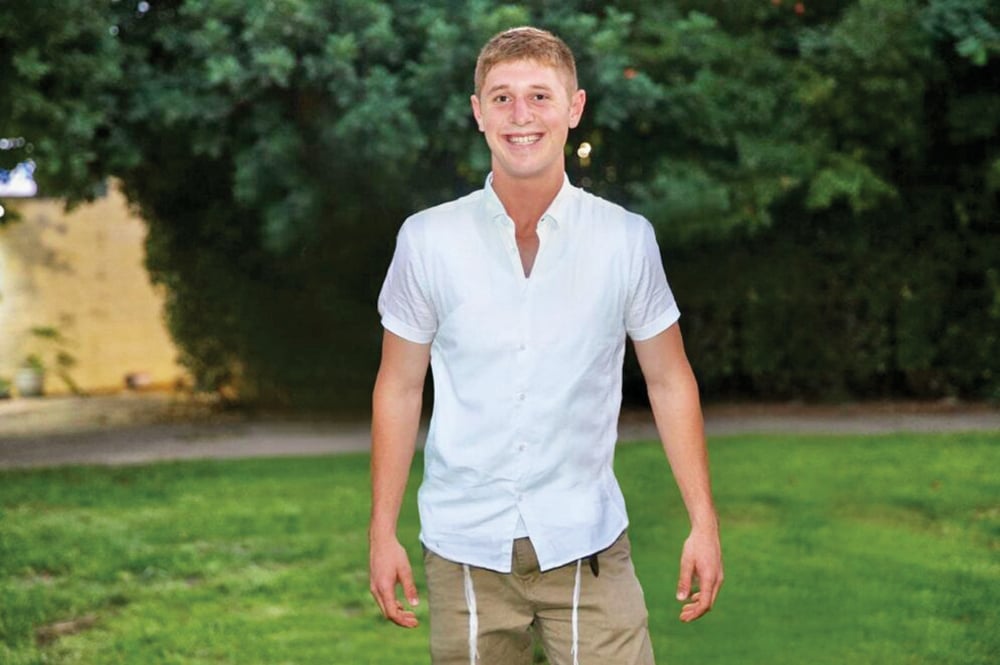
When IDF Staff Sgt. Maoz Morell succumbed to the wounds that he sustained on Feb. 15 while fighting in Gaza, the stinging loss was felt by Jews worldwide. People all over mourned the death of the 22-year-old Morell on Feb. 19, but his tragic death had a particularly significant impact on the Silver Spring community.
Varda Morell (née Linzer), Maoz’s mother, grew up in the Silver Spring Jewish community, attending Hebrew Academy for elementary school before going to the Yeshiva of Greater Washington for high school. She spent a year at Stern College for Women in lieu of her 12th-grade year, after which she went to a seminary in Israel for a gap year. Varda went on March of the Living, which took her to Poland and then to Israel. It was an impactful trip for her, as her grandparents were killed in the Holocaust and her mother and aunt were hidden during World War II.
“That’s when it hit me and I realized that for a Jew to really be safe in this world and to feel connected, he or she needs to be living in Israel,” she said.
Varda decided that she really wanted to be in Israel, and she resolved then to make Israel her home. Thinking back to her move to Israel, Varda quoted her late mother: “When we believe something, when we really believe it in the core of our being, even if everyone else doesn’t, we need to do it.”
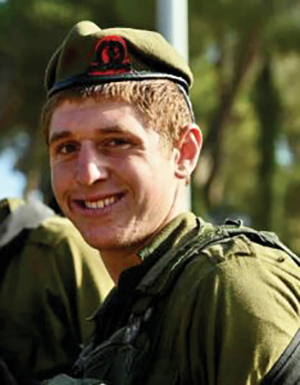
It was during her second year in Israel that she met Eitan Morell, and they got married eight months later. Varda, who is an English teacher, lives with her family in Talmon. She and Eitan had six children—five boys, with Maoz being the fourth.
“Maoz was killed as a hero fighting our enemies … because of people like him, going and doing what they need to be doing, they’re making sure that something like what happened with the Nazis will never be able to happen again,” she said.
“In his day-to-day life, he was a regular kid and he’s a big role model because of that. But as a soldier he really was, from what we’re being told, a real hero and fearless. His last moments were spent saving lives and helping all of his fellow soldiers who were wounded.” Varda said it’s almost as if he had this sense that “when it’s the right thing to do, you do it, and you don’t worry about yourself, you don’t worry about what’s going to happen to you.”
“It was a true selfless act, him being killed for the rest of us,” she said.
Aside from his exploits as a soldier over the past two years, Varda described her son, who was a member of an elite paratroopers unit, as “really an average kid.”
“He had a very hard time expressing himself in speech and in writing. He had learning disabilities—he did not have an easy time in school.”
Although Maoz received remedial academic services, Varda said, “what’s so incredible about him is that he had this drive for things that were important to him.” She recalled that when Maoz was in middle school, he knew that he wanted to get into a good high school, so he worked extremely hard to achieve his goal, which included sitting with his mother on the couch every night to improve his English-reading skills and seeking out help from others to help him be successful.
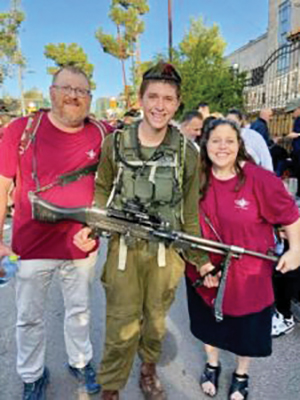
Varda spoke about the fact that even though Maoz’s bar mitzvah parsha was one of the longest in the Torah and he had a difficult time reading, he committed himself to learning it with his father so he could read the entire Torah portion on his big day.
“If something was hard for him, he just asked for help,” she said. “He was able to say, ‘I’m not perfect and I need help and I’m going to ask for help.’”
“I think he could be a hero to kids with learning disabilities and to kids who maybe give up a little more easily than they should,” she added.
In recognition of Maoz’s learning challenges and his determination to overcome them, Varda’s brother, Rabbi Dov Linzer, who serves as president and Rosh HaYeshiva at Yeshivat Chovevei Torah in New York, established a fund in his nephew’s memory at the school to provide funding for training and support services for rabbinical students with learning differences.
Noting that this is “such an appropriate way to honor Maoz’s memory,” Rabbi Linzer said, “It is also a matter that is deeply personal for me.” He spoke about his two sons, both of whom are in their 20s and on the autism spectrum and have learning differences, and how he and his wife “struggled mightily to find them a place within a shul and within a Jewish school.”
“We wound up sending them to a private, secular school because we could not find proper support in the Jewish schools that worked for our kids,” he said, noting that they are both doing very well academically now. “They have only come this far because of the amazing support services that they received … and their unbelievable determination and hard work. Just like Maoz.”
“While we [Yeshivat Chovevei Torah] have provided support services on an ad-hoc basis for students with learning differences, we never had funds specifically allocated for it and we were beginning to realize that there was a good deal more that we could be doing,” Rabbi Linzer said. “When during this horrible week, people connected to the yeshiva reached out to me to ask how they could help and what they could do in Maoz’s memory, I realized that setting up a fund in his memory to provide funding for support services for our rabbinical students with learning differences would be such a powerful way to honor his memory and for us to do more fully what we needed to be doing and what was central to our ethos and values.”
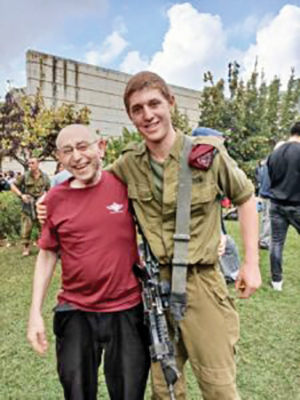
Varda recalled that when Maoz was in 12th grade, he came home one day and told his father that he was about to finish learning all six books of the Mishnah, the written recording of the Oral Law. When Eitan asked Maoz how he was able to do that, he responded that in ninth grade he figured out that if he learned several chapters of the Mishnah each day, he would finish it all by the end of 12th grade. “And that’s what he did,” Varda said.
Varda said that Maoz’s friends in the army talked about how he always had a copy of “Mesillat Yesharim” (The Path of the Just) in the front pocket of his uniform and how he was constantly working on improving his personal character traits. After the members of Maoz’s unit would go on a long hike, they would all sit down, exhausted, and put their heads down, Varda said. Yet, Maoz would pick his head up, take out his “Mesillat Yesharim” and start learning it.
From when the fighting began on Oct. 7 until he came home wounded, Maoz was only able to come home once for two days. During the first seven weeks when he was in Gaza, Varda and Eitan only spoke to Maoz once. They also got one 11-second-long WhatsApp voice message from Maoz. “And basically, it says in Hebrew, ‘Hi, Mommy, I’m fine. OK, I updated you,’” Varda said, laughing at the memory.
“Maoz was like the most popular boy, and he affected so many people,” Varda said. “When we were in the hospital for five days and we knew there was no hope, but he was hanging on, every single friend that he affected came to the hospital, like hundreds of friends came to say goodbye to him.”
“I think that’s the message here, that in order to make a difference and to affect people and to be a special person, you don’t have to be outstanding in something specific. You just have to make sure to be nice to people, to work on your middot (character development), and when there’s something important to you, to set a goal that you can handle and get there.”
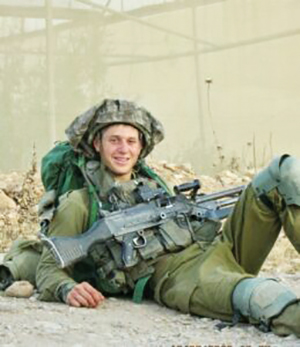
“The fact that we had this very incredibly challenging time in the hospital allowed us to kind of come to terms with what was happening,” Varda said, noting that her family came to Maoz’s funeral on Mount Herzl in Jerusalem “in a different place than a lot of people do,” referring to other families whose loved ones fell in battle and they found out about it by a knock at the door and then had a funeral just a few hours later.
“I’m most thankful to Hashem for during those days in the hospital, giving me the right words to say to my children,” Varda said.
“He was just quiet—he really wasn’t a talker,” Varda said, describing her son. “He was just a good boy.”
Aaron Troodler can be reached at [email protected].









